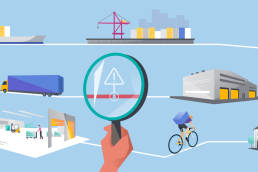With eCommerce booming and urban areas becoming increasingly congested, the demand for location-specific data is growing all the time. As such, it should come as no surprise that businesses from all parts of the supply chain and across various industries are trying to find new ways of leveraging location intelligence – finding new innovations that will improve customer services and deliver strong business returns.
Although the pace of growth for location-based services has been rapid, fortunately, new developments around location intelligence are emerging similarly quickly. In fact, the location analytics market in Europe alone is predicted to be worth more than $7 billion by 2026, driven in part by the growing pressures being placed on supply chains and cities. With so many innovations emerging, these are exciting times to be involved in the delivery and logistics space.
Here’s a look at some recent location intelligence trends you should be aware of:
1. The Internet of Things (IoT)
The Internet of Things (IoT) is a much-hyped technological concept whereby physical devices are fitted with sensors, processing ability, software, and other network technologies. Regarding location intelligence, this means that vehicles, storage containers, and goods can provide businesses with real-time data so that their position and condition are constantly updated.
IoT devices could be truly transformative for location technologies and the emergence of 5G network capabilities will only make IoT more appealing. However, incorporating IoT devices within your logistics service will require some investment – both in terms of network-connected hardware and the expertise required to manage your IoT network. Still, the potential benefits should more than offset this.
2. Geofencing
By using GPS or RFID technology, businesses can engage with customers when they enter a defined geographic boundary by sending messages to their smartphones. This technique is known as “geofencing” and can not only inform companies of when a customer has entered a particular location, but also how long they remained there and when they left.
With geofencing, businesses can optimise profitability and improve their data-gathering processes. By gaining a greater insight into your customer’s movements, you can deliver more targeted marketing and undertake footfall analysis to enhance your business strategy. Some businesses have even had success by setting up their virtual location around a local competitor as part of a highly competitive form of geofencing and geomarketing.
3. Creating a smart city
Proposals for smart city developments are already underway all over the world – and location intelligence is playing a major role. In New York, for example, a pilot program involving hundreds of smart sensors was launched across several business districts to collect data to improve waste collection. Other cities, from Oslo to Dubai, are also looking at ways location intelligence can be deployed to create cutting-edge urban environments.
Location data can help smart cities to better manage traffic flows, environmental upkeep, social cohesion, and mobility generally. Ultimately, smart cities will succeed or fail based on the amount of data used to underpin their services. For local governments and tech firms working in this space, therefore, investing in better location intelligence is essential.
4. Artificial intelligence
Another location intelligence trend that is becoming increasingly important involves artificial intelligence (AI). For example, using AI in combination with location intelligence can enable businesses to automate processes, detect patterns within large sets of data, and make more accurate predictions.
For example, AI-fuelled location intelligence could tell a bank of the best location for a new branch or help a renewable energy company determine the viability of establishing new solar panels in a particular area. By detecting existing trends and delivering predictive analytics, AI can help organisations to unlock the hidden potential within their location intelligence tools
5. Logistics optimisation and route planning
Online shoppers are demanding more and more deliveries, and at the same time, they want them to be delivered faster and at no cost. This obviously creates significant challenges for delivery and logistics firms, which must continually implement new efficiencies to compete with global players like Amazon.
Location intelligence can help businesses in this field like last-mile delivery companies, by reducing costs and improving customer satisfaction levels. Route optimisation tools are increasingly being used to take drivers on the fastest routes, taking real-time traffic information into account. Fuel consumption can also be monitored and customers can be kept constantly updated about the status of their delivery. Essentially, the use of location intelligence ensures neither business nor customer is left in the dark.
Find out more
At Local Eyes, location intelligence is at the heart of everything we do. With our fleet management, telematics and route optimisation solutions, we’ve helped countless businesses to optimise their performance.
Contact us today to find out how we can help you make the most of your location data.




